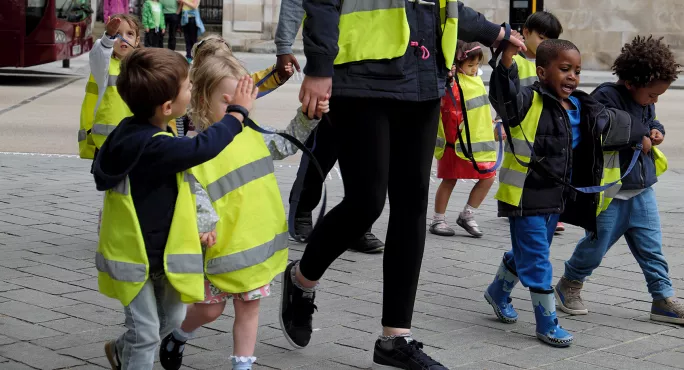- Home
- Sure Start centres have ‘big benefits’ for pupils
Sure Start centres have ‘big benefits’ for pupils

New research shows attending a Sure Start Children's Centre has big benefits for pupils.
The children's centres reduce the gap in hospitalisations between rich and poor areas and these benefits are biggest in poorest neighbourhoods, the study by the Institute for Fiscal Studies (IFS) suggests.
News: Health secretary doesn't rule out banning unvaccinated pupils from school
Research: Early schooling helps narrow boys’ disadvantage gap
Early years: A third of children do not have daily reading time at home
Originally launched 20 years ago, the centres aim to give children in deprived areas the best possible start in life through providing health, education and childcare services.
UCL associate professor and IFS research fellow Gabriella Conti said it was clear there were "big benefits" for children.
"Relative to not having Sure Start, opening one centre for every thousand children prevents 5,500 hospital admissions of 11-year-olds each year," she said.
"Since the benefits are biggest in the poorest neighbourhoods, access to Sure Start can help close around half the gap in hospitalisations between rich and poor areas."
The new research, funded by the Nuffield Foundation, is the first of its kind to follow children who had access to Sure Start right through to the end of primary school and found a significant reduction in hospitalisations.
Researchers found providing peak access to Sure Start closed about half of the gap in hospitalisation rates between the 30 per cent poorest and 30 per cent richest areas by the end of primary school.
Councillor Anntoinette Bramble, chairwoman of the Local Government Association's Children and Young People Board, said the centres could provide a lifeline.
She said: "This could be anything from advice for parents on physical and mental health, caring for a newborn, or simply a place for children to enjoy free play and interact with one another."
But Ms Bramble said ever-tightening budgets were putting pressure on councils to cut or close services without central funding.
"Children's services face a £3.1 billion funding gap by 2025," she said.
"This is why it is hugely important that the government delivers a long-term sustainable funding solution for children's services in this year's Spending Review."
Described by former prime minister Tony Blair as "one of New Labour's greatest achievements", the centres were rolled out across the country but have been cut back by two-thirds since 2010, with 500 mothballed.
However, the research shows the direct savings to the NHS from fewer hospitalisations at ages 5-11 amount to about £5 million per cohort, or just 0.4 per cent of average annual spending on Sure Start.
IFS research economist Christine Farquharson appealed to ministers to follow the evidence for where to invest.
She said: "Sure Start has had a turbulent history, with a fast roll-out followed by deep spending cuts, but these decisions were not always based on thorough evidence about the programme's impacts on children and their families.
"Ahead of the Spending Review, it's crucial that both central government and local authorities use the best evidence available to decide on their vision for Sure Start as the programme turns 20.
"Our findings suggest that limited resources are best focused on the poorest areas."
Paul Whiteman, general secretary of the NAHT headteachers' union, said: “Early years is the most crucial phase of education. If children fall behind at this stage it can prove difficult, often impossible, for them to catch up later, even with additional help. The most cost-effective way to improve educational outcomes for all children, especially those from disadvantaged backgrounds, is by investing in early years education.
“We want to see extra money for education, including early education before children start school, and renewed investment in early years services for families. Without proper investment, the youngest and most vulnerable in our society will be starting off behind, with uncertain chances of catching up.”
A government spokesperson said: “Children’s centres can play an important role in supporting families, and local councils decide how to organise and provide services for families in their areas to meet local needs – whether this is through children’s centre buildings or delivering services in different ways, and we continuously reflect on what works best.
“We want every child to have the best start in life, which is why our Healthy Child Programme means children and families receive five mandatory Health Visitor checks before they are two and a half.
“Our NHS Long Term Plan puts tackling health inequalities at its heart, and more than 700,000 of the most disadvantaged two-year-olds have benefited from 15 hours free childcare since its introduction in 2013 – with 95 per cent of early years providers rated good or outstanding by Ofsted.”
Register with Tes and you can read two free articles every month plus you'll have access to our range of award-winning newsletters.
Keep reading with our special offer!
You’ve reached your limit of free articles this month.
- Unlimited access to all Tes magazine content
- Save your favourite articles and gift them to your colleagues
- Exclusive subscriber-only stories
- Over 200,000 archived articles
- Unlimited access to all Tes magazine content
- Save your favourite articles and gift them to your colleagues
- Exclusive subscriber-only stories
- Over 200,000 archived articles



